 I know I will hook my monster the next day, so I check my tackle
all over again. I'm using 8 and 10 wt. fast action rods with disc
drag reels loaded with floating lines. It's wise to use short-headed
lines, with harder cores and coatings, so that they can stand the
tropical heat and cast large flies easier. I also carry a few fast
sinking lines, just in case if the bigger fish are found deeper.
As for leaders, nothing too much complicated. A heavy butt
looped to about 17 inches of 20 pound mono, knotted to 12 inches
of 60 or 70 pound mono or fluorocarbon as a shock tippet. The
overall length of the leader is of 6 or 7 feet. Some people
simply use a single piece of heavy mono, but since I prefer
to follow IGFA rules I use the 20 pound tippet. You might
loose some fish, but you´ll gain in sportsmanship and who
knows . . . you might even catch the next world record!
I know I will hook my monster the next day, so I check my tackle
all over again. I'm using 8 and 10 wt. fast action rods with disc
drag reels loaded with floating lines. It's wise to use short-headed
lines, with harder cores and coatings, so that they can stand the
tropical heat and cast large flies easier. I also carry a few fast
sinking lines, just in case if the bigger fish are found deeper.
As for leaders, nothing too much complicated. A heavy butt
looped to about 17 inches of 20 pound mono, knotted to 12 inches
of 60 or 70 pound mono or fluorocarbon as a shock tippet. The
overall length of the leader is of 6 or 7 feet. Some people
simply use a single piece of heavy mono, but since I prefer
to follow IGFA rules I use the 20 pound tippet. You might
loose some fish, but you´ll gain in sportsmanship and who
knows . . . you might even catch the next world record!
We lay in our hammocks and start to chat a little about the
fishing. Peacock Bass, called Tucunaré in Brazil, are cichlids.
There are many species of them, but the one that draws most
attention is the big Temensis, our goal in this trip. They
eat almost exclusively smaller fishes and they usually prefer
to ambush their prey, hiding among structures. But at times
they actively corral and chase passing schools of baitfish.
They have a spot at the base of their tail, this is to simulate
an eye and its main function is probably to confuse predators
and/or to confuse baitfish. A baitfish might see the false
eye at the tail and run to the other direction, right toward
the mouth of the Peacock Bass.
Today most waters reached by the larger commercial and sport
fishing boats are over fished. Peacock Bass are extremely
sensitive to any fishing pressure and this explains why we
have to travel so far. Only the smaller regional boats can
reach the remote headwaters of the rivers, and the long
"expedition" style trip is worth it, because we know that
at the end we'll find what every tropical fishermen dreams
of: lakes that were never fished before and obviously full
of large Tucunaré!

We finally manage to sleep, listening to the mysterious sounds
of the jungle at night. It's strange to think that you're right
in the middle of a remote area of the Amazon, 2 days from the
nearest telephone. This is not a place to make mistakes.
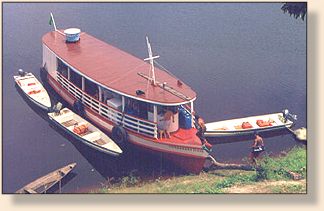 I'm awakened by the loud sounds of a group of macaws nearby, it's
5:45 AM as we quickly eat something before going out for our first
full day of fishing. As we enter the lake I can almost feel the
presence of big fish. Soon we see action, as a pair of large
Peacock Bass corral and attack a school of baitfish. The baitfish
gets so panicked that some even jump out onto dry land! It's a
world of eat or be eaten.
I'm awakened by the loud sounds of a group of macaws nearby, it's
5:45 AM as we quickly eat something before going out for our first
full day of fishing. As we enter the lake I can almost feel the
presence of big fish. Soon we see action, as a pair of large
Peacock Bass corral and attack a school of baitfish. The baitfish
gets so panicked that some even jump out onto dry land! It's a
world of eat or be eaten.
|

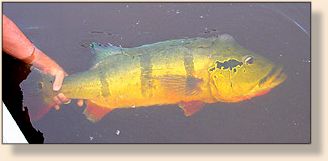




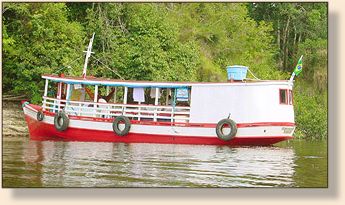


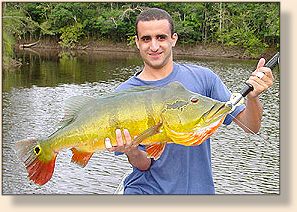
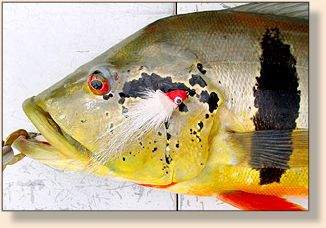
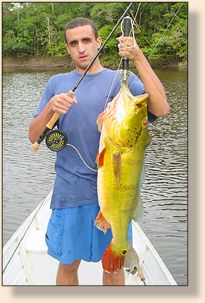 The right fly selection is extremely important if you want to
catch a nice fish. Large Peacock Bass eat some pretty large
baitfish, so you must use very large flies. Avoid using anything
smaller than 6 or 7 inches, otherwise you'll probably just hook
small fish. Personally I like streamers and divers over 8 inches
in length tied on strong 3/0 to 5/0 hooks. They don't care much
about colors, just be sure to bring plenty of white and dark
shaded flies. Noisy divers are great and provoke amazing attacks,
but sometimes streamers that push a lot of water catch more fish.
The right fly selection is extremely important if you want to
catch a nice fish. Large Peacock Bass eat some pretty large
baitfish, so you must use very large flies. Avoid using anything
smaller than 6 or 7 inches, otherwise you'll probably just hook
small fish. Personally I like streamers and divers over 8 inches
in length tied on strong 3/0 to 5/0 hooks. They don't care much
about colors, just be sure to bring plenty of white and dark
shaded flies. Noisy divers are great and provoke amazing attacks,
but sometimes streamers that push a lot of water catch more fish.